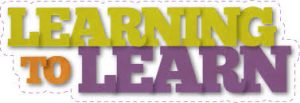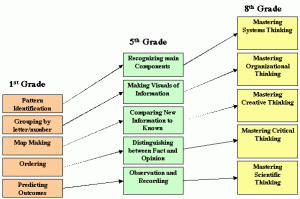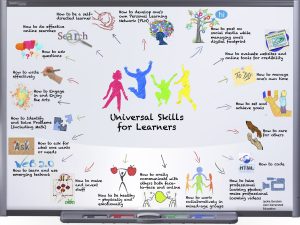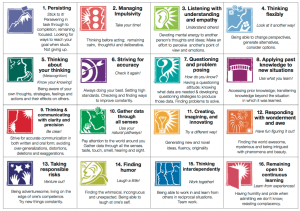 Learning to Learn on Coursera.org, the missing piece of the puzzle, especially if you combine it with the Playground: the partner calls, and the skill learning challenge.
Learning to Learn on Coursera.org, the missing piece of the puzzle, especially if you combine it with the Playground: the partner calls, and the skill learning challenge.
I’ve completed the first two weeks of study on coursera, with 99% effectiveness measured by the tests: only two mistakes total.. But did I learn the material?
I am finding that I am still having some issues with the vocabulary, so no, I haven’t.
Why didn’t I take a whole week to do a week’s worth of study?
I am like a person who after weeks lost in the desert, finds good drinking water… Hungry, thirsty, excited.
 I am seeing that I’ve never actually learned how to learn, I have been just lucky that some of the ways I was taught used the concepts to teach/learn effectively but didn’t teach them. Why give away all the power, right?
I am seeing that I’ve never actually learned how to learn, I have been just lucky that some of the ways I was taught used the concepts to teach/learn effectively but didn’t teach them. Why give away all the power, right?
I have achieved a certain level of unconscious competence in certain disciplines, but I never had to go through the phase of conscious competence.
In areas of study, where I have been unsuccessful, I had no knowledge of how to learn to help me, nothing to dig me out of the rut I found myself in.
I am, I have been entirely dependent on the teacher providing the methodology and the practicing opportunity for me to produce the results.
Now, that is a tragedy, in a way, but nothing compared to the tragedy of my lack of skill, knowledge, concepts, ideas, that would make me the kind of teacher where the student can go from unconscious incompetence to unconscious competence, without having to learn another course, a course on how to learn. I am setting a goal to become that kind of teacher…
 Most of my students never learned in their past successfully, let alone learn something on their own successfully.
Most of my students never learned in their past successfully, let alone learn something on their own successfully.
And yet, I have been expecting them to do just that… and of course, being frustrated: they don’t even understand the concept of learning, let alone do it.
Two days ago ‘the gods smiled at me’, and lead me to a course on learning how to learn. I found a video on youtube…
Barbara Oakley talk at google
https://www.youtube.com/watch?v=vd2dtkMINIw
Barbara Oakley TED talk
https://www.youtube.com/watch?v=O96fE1E-rf8
that grabbed my attention.
Teachers, leaders are called bad when they change the rules… and I don’t mind being called a bad teacher: unless you learn to learn, you’ll never get the results from my courses that I promise.
Does that make my sales letters a lie? Maybe… And maybe not.
The prevailing mindset
The prevailing mindset
The prevailing mindset
The prevailing mindset
The prevailing mindset
The prevailing mindset (mindset is a fixed way of thinking about something that is bigger, richer, and 90% of the time different from how you think about it) is that hearing something, reading something, will gel into knowledge.
When I listen to the partner calls of the participants in my Playground program, I find that they are like the kids who jump into the water before they learn to swim.
They actually do NO WORK on their own before they get to the call.
So what is the result? two people who don’t know what they are supposed to know to do the work of practicing, so instead they have a heart to heart conversation… musings, philosophical, and irrelevant to the work.. and nothing gets learned.
So if you look, put yourself in their place… what else could you do?
0. Absorb the vocabulary… notice that words are used differently in a new learning: they are distinctions here, precise and most likely different from what they mean in the big world…
Without a working and precise vocabulary you are fish out of water.
Many of my students, when they listen to me, they “translate” what I say to a vocabulary that is neither precise, nor useful, and then they will never get what I am talking about… not the big picture, not any of it… They enjoyed the talk, but learned nothing.
Skills are made up of words… even manual activities like brain surgery.
Unless the surgeon has the exact names of the tools it asks for, the surgery will not be successful, because asking for that little shiny thing with the curved blade will not quite does it… right?
Words are the first level of knowledge chunks that you regularly miss.
- 1. In order to create working chunks of knowledge, first you need to understand what you are learning, and see it in the big picture: how it relates to things you know, like your life, or something you have learned before.Without understanding you will, maybe, go through the motions of learning, but it will result in useless chunks of useless knowledge, that don’t gel into anything coherent.
- 2. Then comes the learning of the elements of the chunk, the content: definitions, lists, symptoms, etc.
- 3. Then comes the most important missing ingredient: recall… being able to say it/do it without looking at the notes, gradually and eventually accurately.
If nothing more happened in the partner calls, I would be still happy, ok, learning happened… But or course, there is more.
The proof of the pudding is in eating it… unless you can use the “chunks” or distinctions in your real life: recognize where it can be used, and actually use it to achieve real success, you still haven’t learned it.
Here is an example: I used the “ouch, that hurts” distinction the other day, when a woman, in spite of my urging, didn’t answer my question. I said: Ouch, that hurts… and stood up and moved to another bench…
To my utter amazement, the woman, maybe for the first time ever, looked at me, and I saw recognition in her eyes. She complimented me on my haircut, and wished me a good week…I felt that she saw me…
I suddenly felt like a person… not that chunk of meat and bones, she had seen before, and had felt a slight disgust about…
Without actually using that “chunk” in real life, I would have never known to what degree people treat me like a thing… and would have never known how to turn it around.
I also saw how I often treat people as things… and I saw how that feels. Ouch, that hurts… lol
So you see, a lot of the work has to get done in your real life, between you and you, between you and the people in your life.
And then you can bring it, as a share, to the partner calls.
Sharing as a transformational AND learning tool
Sharing is different from talking about it. Sharing is giving it over to another person, like you share your birthday cake by giving someone a slice. Unless they get it for themselves, you didn’t share.
In my work, you share transformation. Transformation is getting a new view of life, and in that new view things from the past disappear, and new actions become possible that come from that new view.
An effective share has a format… Everything else is emoting, storytelling, conversation. Not bad, but not what you want in my programs.
Why? On one hand a share looks generous, and it may be. But the purpose, the goal of the share is to make the action you took instinctual. In fact, it is a learning tool. Without it all the learning you have done before disappears and you are left with an unaltered view of life and yourself, as if nothing had happened.
And this is what’s been happening. Not just in my programs, in all transformational programs. In Landmark Education, one half of one percent of the participants learn to share their transformation.
Sharing also causes transformation… so don’t skip it. An effective share is built like this:
- 1. Before the article/distinction/principle life was like this
- 2. Then I got the distinction X… explain distinction
- 3. After the distinction this is what life became… an incident that shows that the distinction/principle actually changed something when applied.
When you share, you practice and deepen your knowledge of the distinction. And you keep on re-opening that new view of life that is the key to your transformed life.
Here is how I explained in an email to a student who wanted to learn to share… so far unsuccessfully.
I used to have daily struggle with my daughter. She misbehaved, she threatened to kill herself, she told me she hated me. It was hell.
Then I learned a distinction: I learned that I have been looking at her as MY DAUGHTER, a role, who is supposed to behave in a way to make my life easy, and make me proud. But that is just one way to see… I could see her as a person, who has as much right to life as I do… and the DAUGHTER role is limiting her in her freedom to be herself… to be a person.
I decided to try it on: treat her as a person.
and then you can tell what happened… and what would have happened without the distinction in a real situation.
Sharing, using that formula to share is like a recall exercise: you cannot do it unless you have the distinction down pat.
So even though you feel that you have learned, you have the illusion of knowledge, not being able to recall wakes you up that in fact you haven’t learned it: more work needs to be invested.
For example, a student, after watching the hour-long video that introduces the concepts of learning to learn, used the word “chunking” incorrectly. He is now, possibly, fancying himself fully equipped to know how to learn…
And that is not an isolated example: I do measure to what degree you are delusional about your knowledge, about your abilities, about your attitudes in the Starting Point Measurements.
Any number above 10% is a reason for concern, and indicates a serious issue with your ability to see things accurately, with being astute.
Your actions will come from what you see, but if what you see is delusional, all or most of your actions will be inaccurate… and you can see what kind of life that leads to…
 PS: Some people opt to have coaching calls with me.
PS: Some people opt to have coaching calls with me.
Those are quite expensive. The assumption is that you’ll learn what I know, learn what I teach through listening… but that has never happened and probably never will.
All coaching calls introduce concepts, principles, distinctions, that need to be learned… If you can’t learn them, don’t know how learn them, or won’t do what it takes to learn them, your net benefit from a coaching call is meager… Because it is not more valuable than reading a book.
Now I am starting to understand why people thank me for my time at the end of a call… they got my time, and that’s that.
Similarly, reading a book doesn’t teach you anything. Watching a video or 10 doesn’t teach you anything.
Of course, if you are already an expert in the field of the book, a book and a video does teach you… In fields where I have enough chunks of knowledge, health, transformation, energies, everything teaches me, because I have chunks of knowledge by the thousands… and I have the art of transferring and connecting the dots. I am starting to see, it would be better and more accurate to say: connecting the chunks… chunks of knowledge.
But in areas where I only have a few, maybe no chunks, reading does nothing to create learning for me.
 Teaching happens when you learn. When you use the principles and the practice of learning.
Teaching happens when you learn. When you use the principles and the practice of learning.
For actual learning to take place, the ideal proportion of input (a course, a video, a book, an article) and implementation, ie doing what it takes to learn it is 1:6. In certain disciplines, like marketing, it is 1:10.
Meaning: you get one hour instruction, and then you spend 6-10 hours to turn it into knowledge you can use.
You think it is over the top? Exaggeration?
Not really.
In architecture school
In architecture school, we had 44 hours of instruction a week, and 90 hours homework assignments a week. Why not 1:6? Because many of the classes were also recall or practice, not lectures. Also… There were not enough hours in the week to sleep as well. A week is 168 hours long…
The more you have learned in life, the faster the learning process will be, because you have useful chunks of accurate knowledge that are on the ready…
But beware of the inaccurate chunks of “knowledge”… they will get you stuck every time.
Here is the link to Coursera.org’s free Learning to learn course
I have also opened a new thread in the discussions forum for the Learning to learn course. Of course, you need to register to post…
